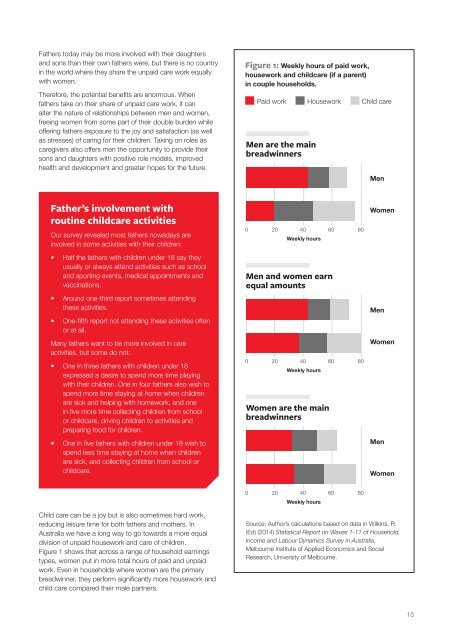State of Australia’s Fathers
1iGWp7w
1iGWp7w
- No tags were found...
Create successful ePaper yourself
Turn your PDF publications into a flip-book with our unique Google optimized e-Paper software.
<strong>Fathers</strong> today may be more involved with their daughters<br />
and sons than their own fathers were, but there is no country<br />
in the world where they share the unpaid care work equally<br />
with women.<br />
Therefore, the potential benefits are enormous. When<br />
fathers take on their share <strong>of</strong> unpaid care work, it can<br />
alter the nature <strong>of</strong> relationships between men and women,<br />
freeing women from some part <strong>of</strong> their double burden while<br />
<strong>of</strong>fering fathers exposure to the joy and satisfaction (as well<br />
as stresses) <strong>of</strong> caring for their children. Taking on roles as<br />
caregivers also <strong>of</strong>fers men the opportunity to provide their<br />
sons and daughters with positive role models, improved<br />
health and development and greater hopes for the future.<br />
Figure 1: Weekly hours <strong>of</strong> paid work,<br />
housework and childcare (if a parent)<br />
in couple households.<br />
Paid work Housework Child care<br />
Men are the main<br />
breadwinners<br />
Men<br />
Father’s involvement with<br />
routine childcare activities<br />
Our survey revealed most fathers nowadays are<br />
involved in some activities with their children:<br />
• Half the fathers with children under 18 say they<br />
usually or always attend activities such as school<br />
and sporting events, medical appointments and<br />
vaccinations.<br />
• Around one-third report sometimes attending<br />
these activities.<br />
• One-fifth report not attending these activities <strong>of</strong>ten<br />
or at all.<br />
Many fathers want to be more involved in care<br />
activities, but some do not:<br />
• One in three fathers with children under 18<br />
expressed a desire to spend more time playing<br />
with their children. One in four fathers also wish to<br />
spend more time staying at home when children<br />
are sick and helping with homework, and one<br />
in five more time collecting children from school<br />
or childcare, driving children to activities and<br />
preparing food for children.<br />
• One in five fathers with children under 18 wish to<br />
spend less time staying at home when children<br />
are sick, and collecting children from school or<br />
childcare.<br />
0 20 40 60 80<br />
Weekly hours<br />
Men and women earn<br />
equal amounts<br />
0 20 40 60 80<br />
Weekly hours<br />
Women are the main<br />
breadwinners<br />
Women<br />
Men<br />
Women<br />
Men<br />
Women<br />
0 20 40 60 80<br />
Weekly hours<br />
Child care can be a joy but is also sometimes hard work,<br />
reducing leisure time for both fathers and mothers. In<br />
Australia we have a long way to go towards a more equal<br />
division <strong>of</strong> unpaid housework and care <strong>of</strong> children.<br />
Figure 1 shows that across a range <strong>of</strong> household earnings<br />
types, women put in more total hours <strong>of</strong> paid and unpaid<br />
work. Even in households where women are the primary<br />
breadwinner, they perform significantly more housework and<br />
child care compared their male partners.<br />
Source: Author’s calculations based on data in Wilkins, R<br />
(Ed) (2014) Statistical Report on Waves 1-11 <strong>of</strong> Household,<br />
Income and Labour Dynamics Survey in Australia,<br />
Melbourne Institute <strong>of</strong> Applied Economics and Social<br />
Research, University <strong>of</strong> Melbourne.<br />
15


